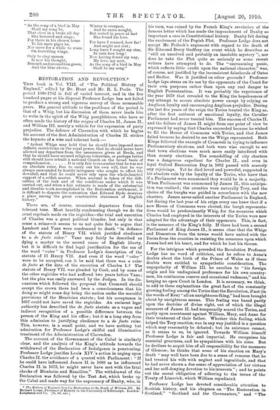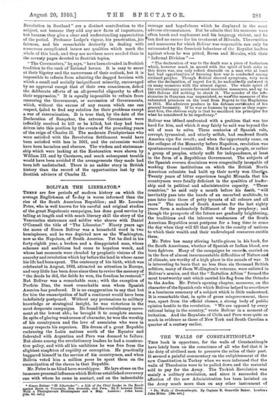RESTORATION AND REVOLUTION.*
THIS book is Vol. VIII. of " The Political History of
England," edited by Dr. Hunt and Mr. R. L. Poole. The period 1660-1702 is full of varied interest, and in the five hundred pages at his disposal Professor Lodge has not failed to produce a strong and vigorous survey of these memorable years. His general attitude to the problems of the period is that of a Whig, but his discussion of them never leads him to write in the spirit of the Whig pamphleteers who have so often made the history of the reigns of Charles II., James II., and William III. merely a vehicle for the expression of party prejudice. The defence of Clarendon with which he begins his account of the first Administration of Charles II. strikes the keynote of a wise and tolerant book
Ardent Whigs may hold that he should have imposed more definite restrictions on the royal power, that he should never have allowed any departure from the assurances given at Breda, and that he should have secured religious toleration, or perhaps better still should have rebuilt a national Church on the broad basis of comprehension It is only fair to reuember that he was not an absolute ruler, free to carry out his own will, that he was always surrounded by hostile intriguers who sought to effect his downfall, and that he could never rely upon the whole-hearted support of a selfish master. When account is taken of the diffi- culties of the task and of the conditions under which it was carried out, and when a fair estimate is made of the substantial and durable work accomplished in the Restoration settlement, it is difficult to dispute the contention that Edward Hyde deserves a place among the great constructive statesmen of English history."
There are, of course, occasional departures from this tolerant tone. Most heartily condemning though we do the cruel reprisals made on the regicides—the trial and execution of Charles was a great political blunder, but only in that sense a crime—it seems to us not quite fair to argue that Lambert and Vane were condemned to death "in defiance of the statute of Henry VII. which justified obedience to a de facto ruler." Vane may fairly be described as dying a martyr to the sacred cause of English liberty, but it is difficult to find legal justification for the use of the word " ruler " in Professor Lodge's description of the statute of 11 Henry VII. And even if the word " ruler " were to be accepted, can it be said that there was a ruler de facto at the date of the execution of Charles I. ? The statute of Henry VII. was pleaded by Cook, and by some of the other regicides who had suffered two years before Vane; but the plea was easily answered by the Judges. In the dis- cussions which followed the proposal that Cromwell should accept the crown there had been a consciousness that his doing so might some day bring the nation under the merciful provisions of the Henrician statute ; but his acceptance in 1657 could not have saved the regicides. An eminent legal authority has described the de facto statute as a vague and indirect recognition of a possible difference between the person of the King and his office ; but it is a long step from this admission to justifying obedience to a de facto ruler.
This, however, is a small point, and we have nothing but admiration for Professor Lodge's skilful and illuminative treatment of the Administration of Clarendon.
The account of the Government of the Cabal is similarly clear, and the analysis of the King's attitude towards the withdrawal of the Declaration of Indulgence is penetrating. Professor Lodge justifies Louis XIV.'s action in urging upon Charles II. the avoidance of a quarrel with Parliament : " If he could have influenced James II. in 1688 as he influenced Charles II. in 1673, he might never have met with the fatal checks of Blenheim and Ramillies." The withdrawal of the Declaration was followed by the Test Act, which broke up the Cabal and made way for the supremacy of Danby, who, in
• The History of England from flu Restoration to the Death of William III. Richard Lodge, Professor of History in the University of Edinburgh. London : Longing= and Co. [7s. 6d. net.]
his turn, was ruined by the French King's revelation of the famous letter which has made the impeachment of Danby so important a case in Constitutional history. Danby fell during the excitement of the Popish Plot. Professor Lodge does not accept Mr. Pollock's argument with regard to the death of Sir Edmund Berry Godfrey (an event which he describes as "still an unsolved and probably an insoluble mystery "), nor does he take the Plot quite so seriously as some recent writers have attempted to do. The "unreasoning panic, which reflects little credit upon the national character," was, of course, not justified by the inconsistent falsehoods of Oates and Bedloe. Was it justified on other grounds ? Professor Lodge lays stress on its use by the opponents of the Court for their own purposes rather than upon any real danger to English Protestantism. It was probably the experience of the year 1679 that revealed to the King the hopelessness of any attempt to secure absolute power except by relying on Anglican loyalty and encouraging Anglican prejudice. During the last five years of the reign the Tories treated the King as, after the first outburst of emotional loyalty, the Cavalier Parliament had never treated him. The success of Charles II. and the failure of James II. might from one point of view be expressed by saying that Charles succeeded because he wished to fill the House of Commons with Tories, and that James failed because he desired to see the Whigs represented. Both Kings followed the example of Cromwell in trying to influence Parliamentary elections, and both were wise enough to see that town elections were much more easily interfered with than county elections. The remodelling of city charters was a dangerous expedient for Charles II., and even in loyal Oxford Restoration Day in 1682 passed with scarcely any rejoicings. Yet he died loved and powerful, supported in his absolute rule by the loyalty of the Tories, who knew that if a Parliament were summoned they would be in a majority. When Parliament was summoned by James II., this anticipa- tion was realised ; the counties were naturally Tory, and the choice of the burghs was guided in accordance with the new charters. James never called another Parliament in England, but during the last year of his reign every one knew that if a new House of Commons were elected, the burgh representa- tives would be predominantly Whig. for the measures which Charles had employed in the interests of the Tories were now adapted for the advantage of their opponents. This, in fact, is the measure of the King's folly. If there had been a second Parliament of King James II., it seems clear that the Whigs and Dissenters from the towns would have united with the Tories from the counties in resisting the measures upon which James had set his heart, and for which he lost his throne.
For the intrigues which preceded the Revolution Professor Lodge has no word of criticism, and he refers to Anne's doubts about the birth of the Prince of Wales as if these doubts were entitled to sympathetic consideration. The unpopularity of William III. he ascribes to " his foreign origin and his undisguised preference for his own country. men, his continuous reserve and occasional rudeness," and his keeping no open Court in London. It is necessary, we think, to add to these explanations the great fact of the constantly growing feeling among the Tories that the Revolution, if not (in the words of Ken) " all an unrighteous thing," had been brought about by unrighteous means. This feeling was based partly upon the doctrine of divine right, out of which the illegal measures of James IL had temporarily scared the Tories, and partly upon resentment against William, Mary, and Anne for their treatment of their father. Whether this feeling, which helped the Tory reaction, was in any way justified is a question which may reasonably be debated; but its existence cannot, as it seems to us, be ignored. Towards William himself Professor Lodge is fair and impartial. He recognises his essential greatness, and he sympathises with his aims. But be declines to acquit him of all responsibility for the massacre of Glencoe; he thinks that some of his emotion on Mary's death " may well have been due to a sense of remorse that he had treated his wife with neglect and ingratitude, and that he had never shown a due sense of appreciation of her virtues and her self-denying devotion to his interests "; and he points out the moral obligation of adhering to the terms of the Treaty of Limerick, which William repudiated.
Professor Lodge has devoted considerable attention to Scottish history, and his chapters on " The Restoration in Scotland," " Scotland and the Covenanters," and " The Revolution in Scotland" are a distinct contribution to the subject, not beeause they add any new facts of importance, but because they giVe a clear and understanding appreciation of the period. Professor Lodge's vigour, his penetration, his fairness, and his remarkable dexterity in dealing with numerous complicated issues are qualities which mark the whole of this book, and they are nowhere more needed than in the seventy pages devoted to Scottish topics.
" The Covenanters," he says, " have been elevated in Scottish tradition to the rank of -national heroes. It is easy to sneer at their bigotry and the narrowness of their outlook, but it is impossible to refrain from admiring the dogged heroism with which a small and socially insignificant minority, encouraged by no approval except that of their own consciences, defied the deliberate efforts of an all-powerful oligarchy to effect their suppression." It is equally impossible to refrain from censuring the Government, or succession of Governments, which, without the excuse of any reason which one can respect, failed to find any solution for their problems except a war of extermination. It is true that by the date of the Declaration of Sanquhar, the extreme Covenanters were inflexibly resolved to kill or be killed; but they had been driven into this position by the events of the preceding years of the reign of Charles II. The moderate Presbyterians who were satisfied with the Revolution Settlement would have been satisfied with less in 1661, and the extremists would have been harmless and obscure. The wisdom and statesman.. ship which were lacking at the Restoration were shown by William III. and by Carstares, and much subsequent trouble would have been avoided if the arrangements they made had been left undisturbed. There is no sadder story in British history than the record of the opportunities lost by the Scottish advisers of Charles II.







































 Previous page
Previous page